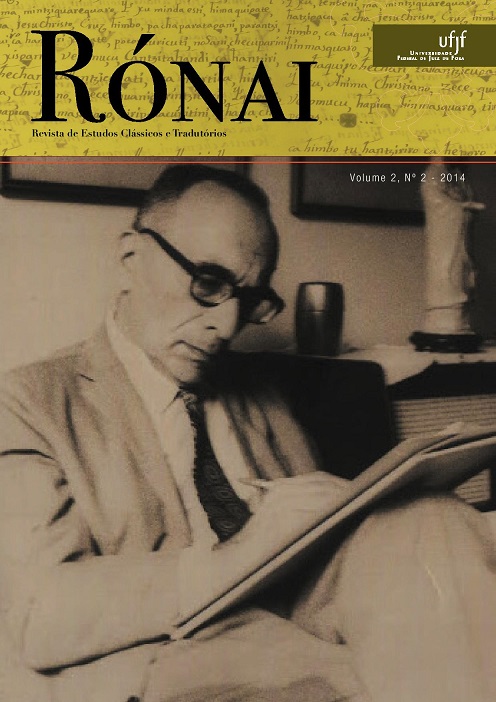Dionysus as an epic hero?
Keywords:
late epic, Dionysiaca, DionysusAbstract
This study is the result of a year of master’s research entitled The heroic face of Dionysus in Dionysiaca of Nonnus from Panopolis. The present work aims to recover the influences in the composition of Nonnus’ epic and the design of its protagonist, Dionysus. The god, who was once portrayed as a deity of wine and drama, is portrayed in Dionysiaca as a hero whose mission is to spread Hellenism worldwide. The author builds a Dionysus who not only has epic characteristics, but characteristics of all ancient Greek literature.
Downloads
References
BEYE, C. “Jason as Love Hero in Apollonius’ Argonautika”. In: GRBS 10, 1969, pp. 31-55;
BOWERSOCK, G. “Dionysus as an Epic Hero”. In: Studies in the Dionysiaca of Nonnus, Cambridge: Cambridge Philological Society, 1994, pp. 156-66;
CAMERON, A. “Wandering poets: a litterary movement in Byzantine Egypt”. In: Historia 14, 1965, pp. 470-509;
CAVERO, L. M. Poems in Context – Greek Poetry in the Egyptian Thebaid 200 – 600 AD. Berlim: W. De Gruyter, 2009
DE LA FUENTE, D. H. Bakkhos Anax – Um estúdio sobre Nono de Panópolis. Madrid: Consejo Superior de Investigaciones Científicas, 2008.
DETIENNE, M. Dionysos at Large. Trad. Arthur Goldhammer. Cambridge, Massachussets e Londres: Harvard University Press, 1986.
EURÍPIDES. As Bacantes. trad. Trajano Vieira. São Paulo: Perspectiva, 2003.
GANTZ, T. Early Greek Myth. London: The Johns Hopkins University Press, Volume 1, 1993.
GERLAUD, B. Nonnos de Panopolis. Les Dionysiaques. Tome VII. Chants XVIII-XIX. Paris: Budé, 1994.
HOLLIS, A. “Some allusions to earlier Hellenistic poetry in Nonnus.” In: The Classical Quarterly, New Series, 1976, Vol. 26, pp. 142-50.
___________________. “Nonnus and Hellenistic Poetry”. In: Studies in the Dionysiaca of Nonnus. Cambridge: Cambridge Philological Society, 1994, pp. 43-62.
HOMERO. Ilíada. Trad. Haroldo de Campos. São Paulo: Arx, 2002.
HOPKINSON, N. Greek Poetry of the Imperial Period: An Anthology. Cambridge: Cambrigde University Press, 1994.
___________________. Studies in the Dionysiaca of Nonnus. Cambridge: Cambrisge Philological Society, PCPhS Suppl. Vol. 17, 1994.
KEYDELL R. Nonni Panopolitani Dionysiaca, 2 vols. Berlin: Weidmann, 1959.
LASKY, E. D. “Encomiastic Elements in the Dionysiaca of Nonnus.” In: Hermes 106, 1978, pp.357-76.
LESKY, A. Geschichte der Griechischen Literatur. Trad. Espanhola de DIAZ REGANON, J. e ROMERO, B. Madrid: Gredos, 1968.
LIVREA, E. ed. Dionysii Bassaricon et Gigantiadis fragmenta. Roma: Bibliotheca Athena, 1973.
MILLAR, F. A Greek Roman Empire: Power and Belief under Theodosius II. Berkeley: University of California Press, 2006.
ROSE, H. J. “Mythological Introdution”. In: Nonnos Dionysiaca: Books 1-15. Trad.
W.H.D. ROUSE. Massassuchets: Harvard University Press, 1940, Pg. Xii.
SHORROCK, R. The Challenge of Epic: Allusive Engagemente in the Dionysiaca of Nonnus. Leiden: Brill Academic Pub, 2001.
___________________. “Nonnus”. In: Foley, J. M. (ed.), A companion to Ancident Epic. Oxford: Blackwell Publishing, 2005, Pp. 374-85;
VIAN, F. Nonnos de Panopolis – Les Dionysiaques, Tome I, Chants I-II. Paris: Les Belles Lettres, 1976, Pp. X-LXXIV.
___________________. “Dionysus in the Indian War: A contribution to a study of the structure of the Dionysiaca”. Trad. E. N. Reed. In: Studies in the Dionysiaca of Nonnus. Cambridge: Cambridge Philological Society, 1994, pp. 86-98;
___________________. L'épopée Posthomérique – Recueil d'études. Alessandria: Edizioni dell'Orso, 2005.
WHITBY, M. “Diverse Nonnus”. In: The Classical Review, New Series, 2001, Vol. 51, n°. 2, pp. 236-7;
WILAMOWITZ-MOELLENDORF, U. von. Der Glaube der Hellenen. Berlin: Weidmannsche Buchhandlung, 1932.
Downloads
Published
How to Cite
Issue
Section
License
Copyright (c) 2015 Rónai – Revista de Estudos Clássicos e Tradutórios

This work is licensed under a Creative Commons Attribution 4.0 International License.
Copyright
The authors of the published contributions agree with the following items:
1. The authors keep the copyright and convey to the journal the right of first publication, the work being licensed under a Creative Commons Attribution License 4.0 International.
2. The authors are allowed and stimulated to publicize and distribute their work online after the publication in the journal, recognizing first publication in this journal.
3. The authors of the approved works authorize the journal to distribute their content, after publication, for reproduction in content indexes, virtual libraries and similars.
For more information about Creative Commons Attribution License 4.0 International, please, go to: https://creativecommons.org/licenses/by/4.0/deed.en
Editorial exemption
The authors of the published contributions are entirely and exclusively responsible for their contents. Its content does not represent an official position of Rónai - Revista de Estudos Clássicos e Tradutórios neither of Faculdade de Letras da Universidade Federal de Juiz de Fora or their partner institutions.



